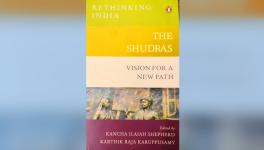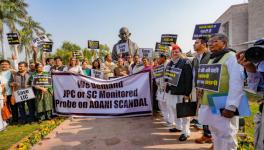Jharkhand Polls: Alliance Dynamics in Past 3 Assembly Elections
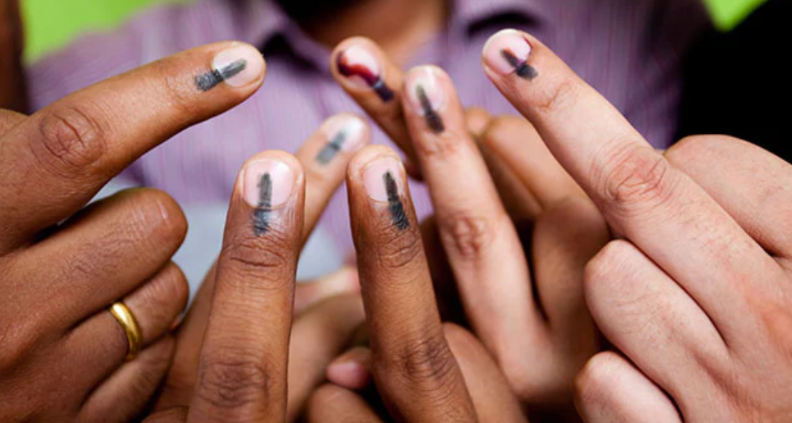
Representational Image
Assembly elections in Jharkhand will be held in five phases for 81 seats from November 30 and the results will be declared on December 23. The ruling Bharatiya Janata Party (BJP) has announced to contest alone in these elections and are pitted against the alliance of Congress, Jharkhand Mukti Morcha (JMM) and Rashtriya Janata Dal (RJD). Here is a closer look at how various alliances have fared in the state Assembly elections since 2004.
As all the parties have released their final list of candidates, BJP is contesting in 81 constituencies, Congress in 31, RJD will contest on seven seats and JMM in 43 seats.
Other parties gearing up for the elections include Jharkhand Vikas Morcha (JVM), All Jharkhand Students' Union Party (AJSUP), Janata Dal (United) [JD-U], Communist Party of India (Marxist Leninist Liberation) [CPI-ML] and Marxist Coordination Committee (MCC), which have been rolling considerable votes and seat share in the previous elections.
In the previous Assembly elections in 2014, BJP and AJSUP had formed a pre-poll alliance and secured 37 and 5 seats respectively, forming the government with BJP’s Raghubar Das as their chief minister. All the other key parties, Congress, JMM and RJD had contested separately in the 2014 elections.
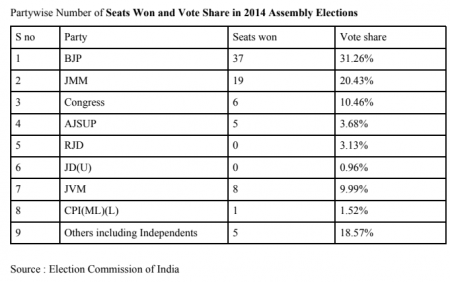
Considering the vote share in 2014 Assembly elections, it appears that the BJP is going to face a tough battle this time, as the combined vote share of Congress, JMM and RJD last time adds up to 34.02% against BJP’s 31.26%.
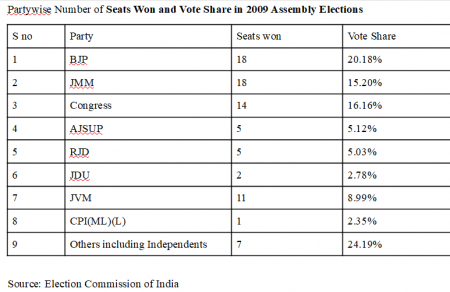
During the 2009 Assembly elections, while there were no major alliances, BJP went to polls with JD(U), while JMM, Congress and JVM went separately with their own understandings among other smaller parties. That time, BJP secured highest number of seats and vote share (18 seats, 20.18% vote share) followed by JMM (18 seats, 15.20% ), Congress (14 seats, 16.16%) and JVM secured 11 seats and 8.99% vote share.
Post results, JMM’s Shibu Soren became CM with a post-poll understanding with BJP.
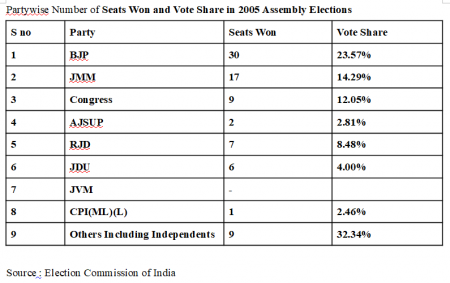
Meanwhile, during the 2004 elections, BJP and JMM formed into a post poll alliance and elected JMM’s Shibu Soren as CM but within 10 days, BJP’s Arjun Munda became the CM. And later in September 2006, Independent candidate Madhu Koda became the CM for almost the next two years to be replaced by Shibu Soren in August 2008. The term ended with a presidential rule from January to December 2009.
Get the latest reports & analysis with people's perspective on Protests, movements & deep analytical videos, discussions of the current affairs in your Telegram app. Subscribe to NewsClick's Telegram channel & get Real-Time updates on stories, as they get published on our website.














